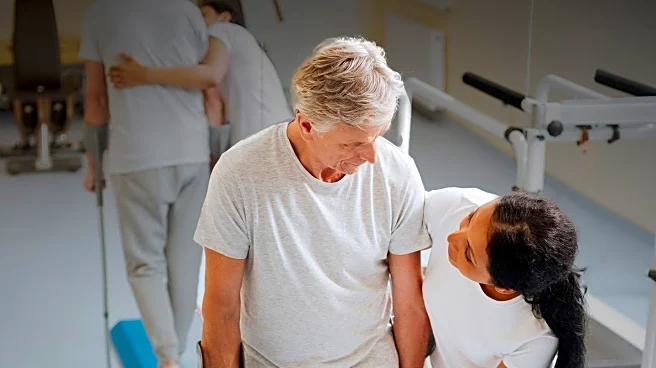What's Happening?
Two years following the October 7 Hamas attacks, Hadassah Medical Center in Israel remains deeply involved in the rehabilitation of soldiers and civilians affected by the conflict. Dr. Sheer Shabat Ben-Yehuda, a senior resident in rehabilitation, highlighted
that while the influx of new patients has decreased, the center continues to treat individuals suffering from long-term physical and emotional trauma. The facility has expanded its services with the opening of the Gandel Rehabilitation Center in 2024, which has tripled its inpatient capacity. This expansion allows for a broader range of therapies, including dog therapy, acupuncture, and yoga, aimed at aiding recovery. Dr. Yoram Weil, director of the Orthopedic Trauma Unit, emphasized the center's success in limb-saving procedures, attributing it to advanced 3D printing technologies and effective collaboration with rehabilitation teams.
Why It's Important?
The ongoing rehabilitation efforts at Hadassah Medical Center underscore the long-term impact of conflict on individuals and healthcare systems. The center's work highlights the importance of comprehensive rehabilitation services in addressing both physical and psychological injuries sustained during warfare. The use of innovative technologies and expanded facilities reflects a commitment to improving patient outcomes and quality of life. This situation also illustrates the broader challenges faced by healthcare providers in conflict zones, where the need for sustained medical and psychological support remains critical long after the immediate crisis has passed.
What's Next?
Hadassah Medical Center is likely to continue its focus on rehabilitation, potentially expanding its services further to accommodate ongoing needs. The success stories of patients, such as a soldier who regained mobility and communication skills, serve as motivation for the staff and may inspire similar initiatives in other conflict-affected regions. The center's approach could influence future healthcare policies and rehabilitation practices, emphasizing the integration of advanced technologies and holistic therapies in patient care.
Beyond the Headlines
The work at Hadassah Medical Center highlights the ethical and humanitarian responsibilities of medical institutions in conflict zones. The center's efforts to save limbs and improve the quality of life for patients reflect a broader commitment to human dignity and resilience. This case also raises questions about the allocation of resources in healthcare systems, particularly in regions where conflict is a persistent threat. The integration of innovative technologies and therapies could set a precedent for future medical practices in similar contexts.

















